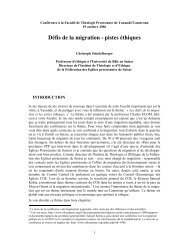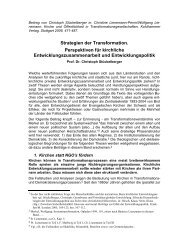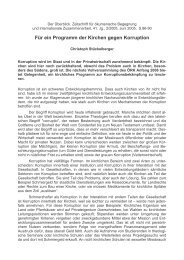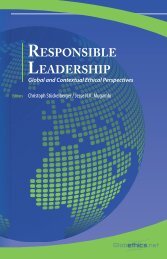BREAK THE CHAINS OF OPPRESION AND THE YOKE OF ...
BREAK THE CHAINS OF OPPRESION AND THE YOKE OF ...
BREAK THE CHAINS OF OPPRESION AND THE YOKE OF ...
You also want an ePaper? Increase the reach of your titles
YUMPU automatically turns print PDFs into web optimized ePapers that Google loves.
PREAChing message of the free grace of God to all people” (Barmen VI). Because, in the<br />
Bible, justice is first and foremost a summarized rephrasing of God’s own good<br />
works. The Psalms declare: “How wonderful are the things the Lord does …his<br />
righteousness endures forever” (Ps 111:2f.). Hence, “the heavens proclaim his<br />
righteousness” (Ps 97:6) “and from one generation to the next … shall sing aloud<br />
of [his] righteousness” (Ps 145:7).<br />
God’s justice (i.e., righteousness) – that is, his active caring for his creation – is<br />
his attentive accompaniment of his people; that is, his saving deeds and his good<br />
guidance. Justice – that is, his constant listening to the cries of the suffering – is<br />
his strong arm that liberates the captives; and in all this is God’s passionate love<br />
for his people, which can rage terribly about their wickedness and stupidity, but<br />
which can do nothing else except be “merciful and gracious, slow to anger and<br />
abounding in steadfast love” (Ps 103:8). Where the justitia is blind, indeed inevitably<br />
must be blind to avoid being dazzled by the specific case at hand, it is<br />
said of the God of Israel: he watches, he listens and he yields – he applies the<br />
freedom of his love by doing justice to each of his creatures in a way that is conducive<br />
to his or her life in his or her particular situation. Justice: that is the way<br />
of our God through the time and space of his creation, the way on which he<br />
keeps his covenant and faithfulness to Israel unto eternity, and through Israel to<br />
the whole world, and never abandons the work of his hands. And hence: in the<br />
path of righteousness there is life (Prov 12:28a).<br />
Also in the AC, this prae of God’s justice takes precedence before all human endeavour.<br />
That is why the statements of faith always start with confessions of belief<br />
in God before going on to the rejections of economic injustice and ecological<br />
destruction.<br />
In this context, I �believe �it is important � to explicitly � praise � the confessional character<br />
of the Accra Declaration. For, in a very specific way, it corresponds to the<br />
fact that for us Christians standing up for justice is not a matter of political belief,<br />
but the response to God’s own words and deeds, through which we live and<br />
to which we, in faith, bear witness.<br />
In order to make this clear, the sermon will, however, have to make the praise for<br />
God’s justice resound more clearly and comprehensively than the Accra Confession<br />
did or was able to do. I draw attention again to what was said at the beginning<br />
regarding the distinction between confession and sermon. Whereas the Accra<br />
Confession recalls God’s action in rather dry theological sentences, the sermon,<br />
guided by Bible stories, tells of the salvation work of God in such a way<br />
that it becomes clear: what happened at that time is also true today; the (hi)story<br />
of God with his people also embraces my world and my (hi)story. God is able<br />
to change my world and my life, and he will do so!<br />
Hence, the sermon should avoid speaking “gesetzlich” (which means mixing<br />
gospel and the law) about the gospel (Manfred Josuttis). This always happens<br />
when the impression is given that human deeds could/should take the place of<br />
��������������������������������������������<br />
� � � ��������������������<br />
�<br />
�<br />
– PREACHING ON JUSTICE – 15










